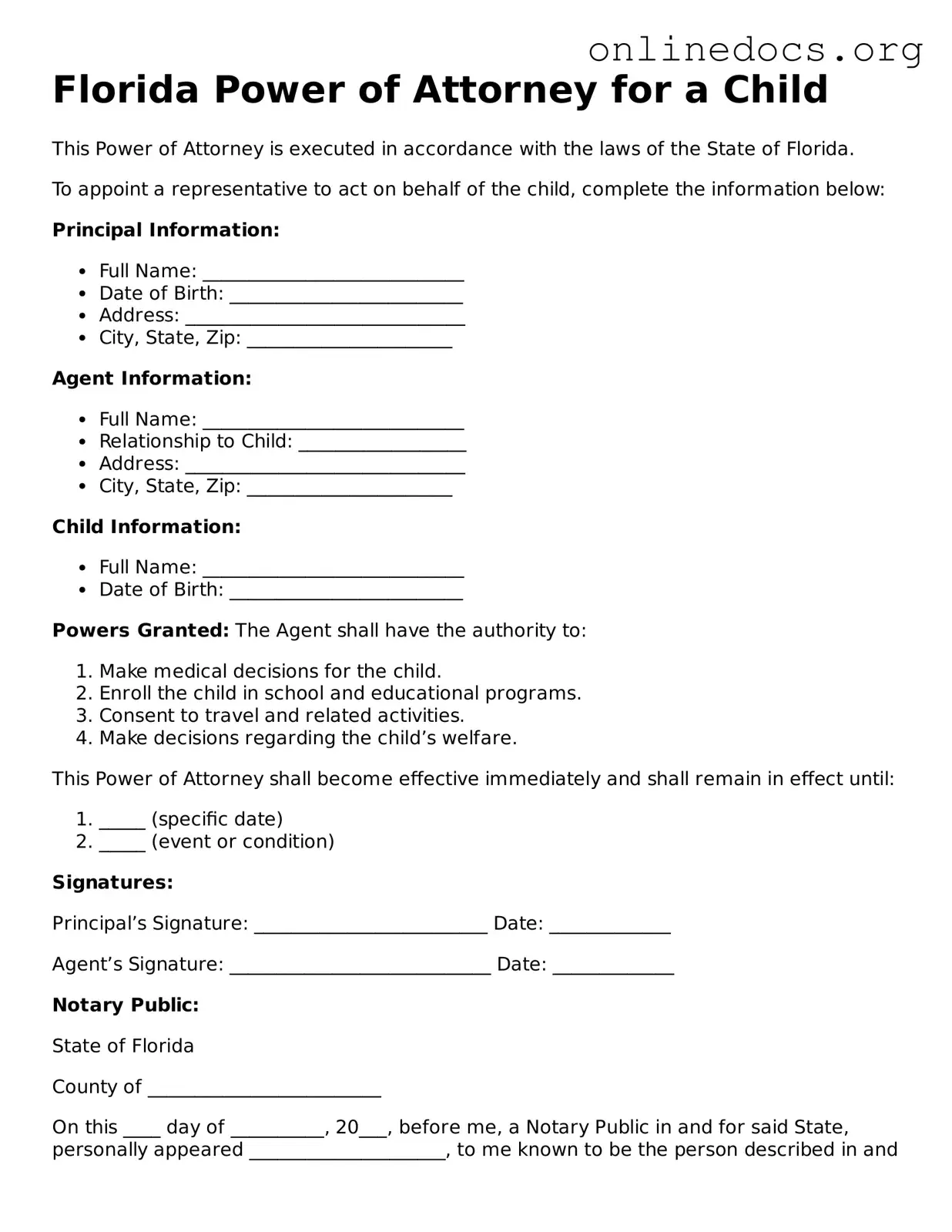The Florida Power of Attorney for a Child form is similar to a general Power of Attorney document, which grants an individual the authority to act on behalf of another person in various matters. In both cases, the principal, or the person granting authority, designates an agent to make decisions or manage affairs. The key difference lies in the specific focus of the child power of attorney, which is tailored to address the needs and responsibilities associated with caring for a minor child.
Another document that shares similarities is the Medical Power of Attorney. This form allows an individual to appoint someone to make healthcare decisions on their behalf if they become unable to do so. Like the Power of Attorney for a Child, it emphasizes the importance of having a trusted person in place to make critical decisions when necessary. However, the Medical Power of Attorney is specifically concerned with medical care and treatment, whereas the child power of attorney encompasses broader aspects of a child's welfare.
The Guardianship Agreement is also comparable, as it involves appointing someone to care for a child. This document is typically more formal and may require court approval. While both documents aim to ensure the child's well-being, the Guardianship Agreement often establishes a more permanent arrangement, whereas the Power of Attorney for a Child can be temporary and specific to certain situations.
A Child Custody Agreement is another related document. This agreement outlines the arrangements for the care and custody of a child following a separation or divorce. Similar to the Power of Attorney for a Child, it prioritizes the child's best interests. However, custody agreements are often more focused on living arrangements and parental rights, while the power of attorney grants authority for day-to-day decisions.
The Authorization for Release of Medical Records is akin to the Power of Attorney for a Child in that it allows designated individuals to access a child's medical information. Both documents ensure that caregivers can make informed decisions regarding a child's health. However, the authorization is specifically limited to medical records, while the power of attorney encompasses broader responsibilities.
The Travel Consent Form also shares similarities with the Power of Attorney for a Child. This document allows a child to travel with someone other than their parents or legal guardians. Both forms ensure that the adult accompanying the child has the necessary authority to make decisions during travel. However, the Travel Consent Form is specifically designed for travel situations, while the power of attorney can cover a wider range of decisions.
For those navigating the complexities of vehicle sales, it’s crucial to be aware of the legal frameworks in place to protect both buyers and sellers. One of the essential documents in this process is the https://californiapdfforms.com/vehicle-purchase-agreement-form/, which outlines the pertinent details of the transaction, ensuring clarity and security for both parties involved.
The Affidavit of Support is another document that serves a similar purpose. It is often used in immigration contexts to demonstrate that a child will be financially supported. While the Power of Attorney for a Child does not directly address financial support, both documents can be part of a larger plan to ensure a child's well-being and stability.
Lastly, the Temporary Custody Agreement, often used by relatives or friends caring for a child in the absence of the parents, is similar in intent. It provides a framework for care and responsibilities, much like the Power of Attorney for a Child. However, the Temporary Custody Agreement is more focused on establishing a custodial arrangement, while the power of attorney allows for broader decision-making authority.
